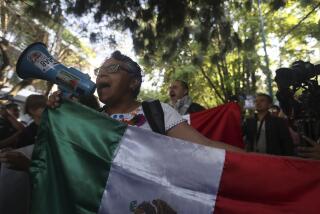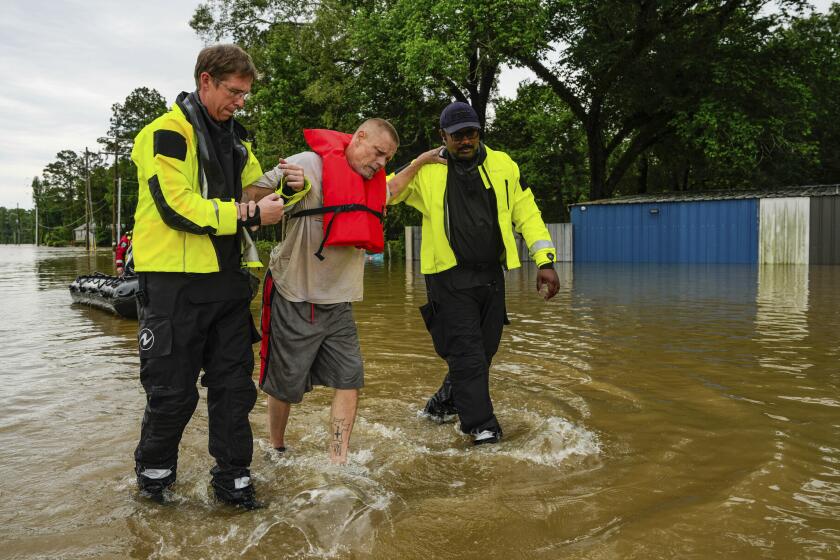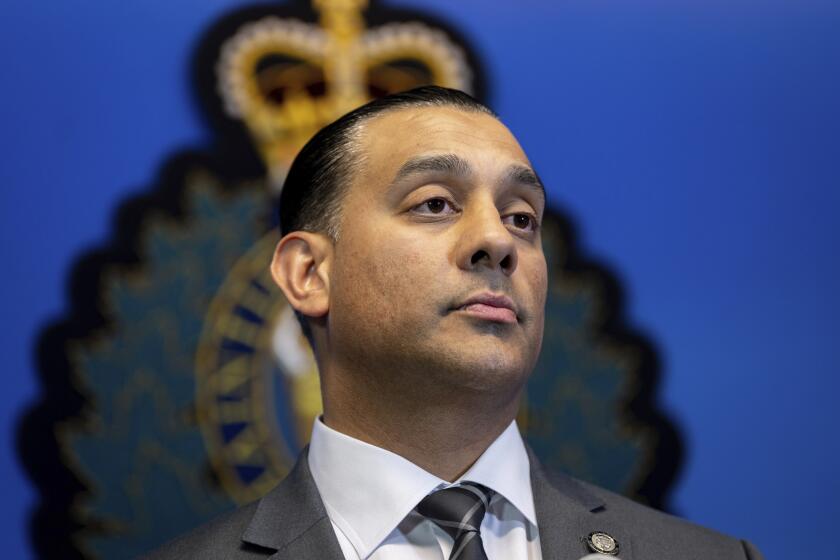Nicaragua wants more ocean territory, and neighbors are angry
MEXICO CITY — Nicaraguan President Daniel Ortega is making an expanded push for more territory in the Caribbean Sea, appealing to international jurisprudence and rankling many of his neighbors.
Colombia was especially vocal, calling Nicaragua’s new claims “excessive” and reiterating that it would defend itself against “unfounded pretensions” of the Central American country.
Ortega’s government formally petitioned the International Court of Justice on Monday to define the maritime border between Nicaragua and Colombia and to include an eastward extension of what Nicaragua claims as its continental shelf deep into the Caribbean. For Nicaragua, that would be a territorial gain of about 150 nautical miles beyond what the court established in November.
In a statement, Ortega said Colombia’s refusal to recognize the November ruling was in part what motivated the new petition.
“As a peaceful country and defender of the rule of law,” the statement said, “Nicaragua once again places its trust in the court … without harming the rights of third nations.”
But other nations in the region, notably Panama and Costa Rica, are eyeing Nicaragua’s actions with suspicion.
Nicaragua’s enhanced claim of offshore territory follows its announcement in June that it was partnering with a Chinese firm to build a $40-billion sea-to-sea canal, expected to be completed in a decade, and compete with the century-old Panama Canal.
All of this is making Panama nervous. Nicaragua’s most recent Caribbean petition could tread into sea territory that Panama claims. Panamanian Foreign Minister Fernando Nuñez said this week that his nation “will not cede a single little piece” of maritime territory.
“There is nothing to discuss” with Nicaragua, Nuñez said.
He was echoing Panamanian President Ricardo Martinelli, who this month accused Nicaragua of trying to “grab” waters belonging to Panama.
Costa Rica, meanwhile, was already embroiled in spats with Nicaragua. The two countries have been fighting over access to the San Juan River, which forms their border. Costa Rica on Tuesday accused Nicaragua of using a dredging vessel to dig two new canals through an island claimed by Costa Rica to expand Managua’s access from the river to the Caribbean.
“We do not have the least doubt about what they are trying to do,” Costa Rican President Laura Chinchilla said of Nicaragua’s actions, vowing to present a formal diplomatic note of protest. “We are not surprised, but we are outraged,” she said at a news conference in San Jose, the Costa Rican capital.
Nicaragua denied that it had trespassed.
In its filing to the International Court of Justice in The Hague, Ortega’s government asked for precise definition of the border between Nicaragua and Colombia in light of the November ruling. Nicaragua sought to include territory that it said belongs to it, as part of the eastward extension of its continental shelf into the Caribbean.
Nicaragua’s claim of additional marine territory in the Caribbean comes a week after Colombian President Juan Manuel Santos described as “inapplicable” the November decision giving Nicaragua 27,000 square miles of marine territory that had been controlled by Colombia since 1803. Santos also denounced Nicaragua’s “expansionist pretensions.”
Santos was moved to finally state Colombia’s position after Nicaragua last month announced plans to auction off oil exploration rights in the disputed blocks. Santos claimed that much of the area is a protected UNESCO-recognized underwater environmental preserve and thus off limits to oil drilling.
At stake, in addition to potential oil exploration, are traditional fishing grounds for Colombians.
The long-running Colombia-Nicaragua case is one of several territorial disputes brewing in Latin America. Peru has asked the international court to rule that Chile should cede to it 10,000 square miles of the Pacific Ocean. Landlocked Bolivia has long tried to recover some of the Pacific Ocean coastline that it lost as a result of the 1884 peace treaty signed after its war with Chile.
Settling the disputes involves the application of two sometimes opposing principles: what has been agreed to in the past in the form of binational treaties versus what modern conventions deem is a “fair” division of territory.
Some countries that have sought a redrawing of boundaries have used the same argument Nicaragua cited Monday, that it should control the marine extension of its continental shelf.
Although Ortega’s expansionist impulses make neighbors nervous, the onetime revolutionary leader who has steadily become a more autocratic president is winning some praise at home even among his fiercest critics for his use of legal procedures to fight for maritime territory.
“Putting aside the authoritarianism with which Ortega handles domestic issues, there is a general consensus that the court matter has been handled well by Ortega and his team,” said Carlos Fernando Chamorro, a prominent opposition journalist. “Would that Ortega acted that way with the Nicaraguan Constitution.”
Times staff writer Wilkinson reported from Mexico City and special correspondent Kraul from Bogota, Colombia.
More to Read
Start your day right
Sign up for Essential California for news, features and recommendations from the L.A. Times and beyond in your inbox six days a week.
You may occasionally receive promotional content from the Los Angeles Times.







